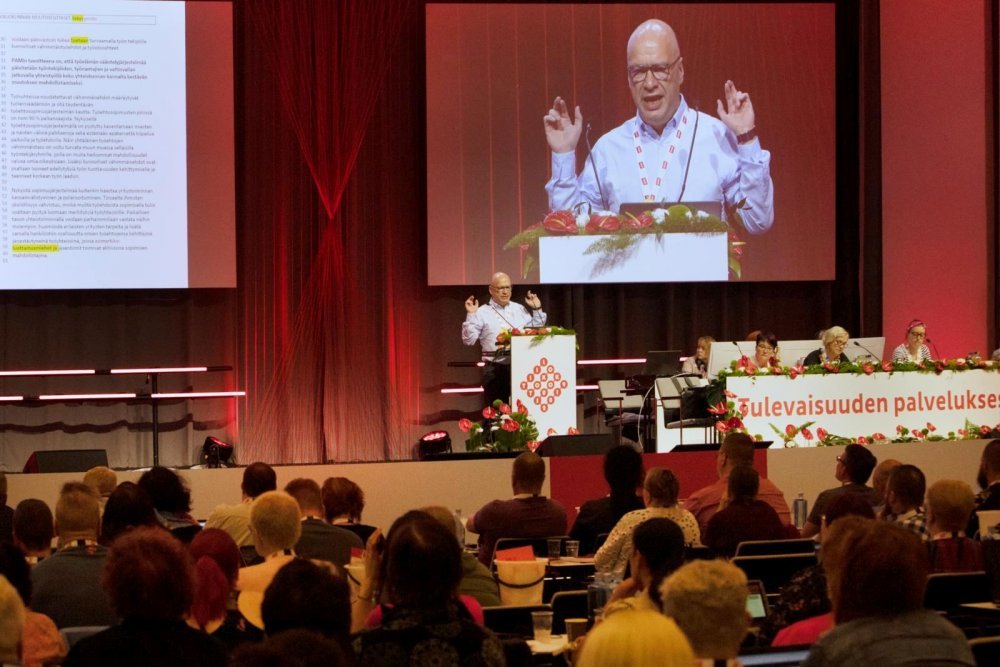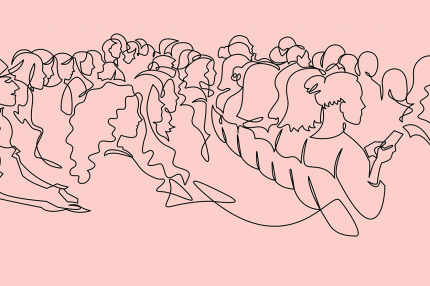Union Congress
PAM’s policy line stresses developing the union’s services and influencing training and social safety networks
Congress representative Timo Tiikkaja projected onto the wall the deletions and additions proposed by the working group on reform of the agreement system. Photo: Heli Sorjonen
The union’s new priority action programme sets out the union’s six priorities for the years 2020–2024. For Congress representatives it was important to improve the support that shop stewards get.
Changes in work and digitalisation are the dominant themes in the union’s new priority action programme. Many people already have flexible employment relationships, and digitalisation is also changing work functions and increasing work in the platform economy. The main aim of the programme is that developments in technology should also benefit service sector workers, who are the ones most affected.
The focus is now more about the union influencing the development of a humane society and social security. It is seen as essential to develop the union’s services so as to benefit different groups of members. The union is putting a greater emphasis on training and life-long learning so that service sector workers can meet the challenges of technological development.
The representatives elected at the union Congress in Helsinki on 4–6 June put forward amendments to the draft programme. Anne Nyman, who oversaw discussions on the priority action programme at the Congress, was pleased with the work done:
“We had a good atmosphere. The changes were genuinely debated”, says Nyman, who was elected to PAM’s Council, of the working groups that continued into the night.
A strategy and operational objectives will be developed based on the priority action programme. Nyman thinks, however, that many people would like to see clear objectives in the priority action programme itself, which remained rather theoretical.
“People wanted to see positive, precise additions to the programme", says this Nokia Citymarket employee, workplace shop steward and deputy MP, who got many votes in the spring parliamentary elections.
The priority action programme was adopted on the last day of the Congress following a test vote on some of the amendments. In the debate on the priority action programme, many speakers said that the union should support shop stewards more comprehensively in their work.
“This is a major issue for the union’s future that we need to solve", commented Merja Stenman-Björn, for example.
PAM’s priorities for 2020–2024:
1. Skilled and positive people guarantee the best service
Service skills are increasingly important in digitalisation. PAM wants to enhance possibilities for service sector professionals to influence their work and developing it.
Increase appreciation of service sector occupations and improve working conditions.
2. Changes in the agreement system
PAM’s objective is to update the agreement system together with the government and employers. The objective is that workers’ minimum conditions should be defined in collective agreements. Organised workplaces can be given more possibilities for local agreement.
3. Social responsibility as a business success factor
PAM’s objective is to get businesses to understand that in a socially responsible company employees can manage on their wages. Fair working life practices and wellbeing at work for employees guarantee companies business success. Responsible businesses also improve conditions for shop stewards.
4. Developing an educational basis and lifelong learning
PAM’s objective is to enhance employees’ basic skills to make it possible to develop vocational skills in digitalisation. Schools and educational institutions should teach working life and civil skills to reinforce people’s interest in social policy making.
5. Humane social model
PAM’s objective is to reinforce the safety network of the welfare society. In social security reforms, the union highlights needs as perceived by service sector employees. Social security should create possibilities, not humiliate people. The objective is that all work is done in a way that guarantees people unemployment and pension security.
6. A diverse membership and an evolving lobbying organisation
PAM develops its own services to respond better to the needs of different members. The objective is that more members have a shop steward and that these have better operating conditions. The union will continue organisation work, so that members can solve problems they encounter at the workplace. The union provides a wide range of support for shop stewards.
PAM:s Priority Action Programme for the years 2020–2024, you will find here in English.





